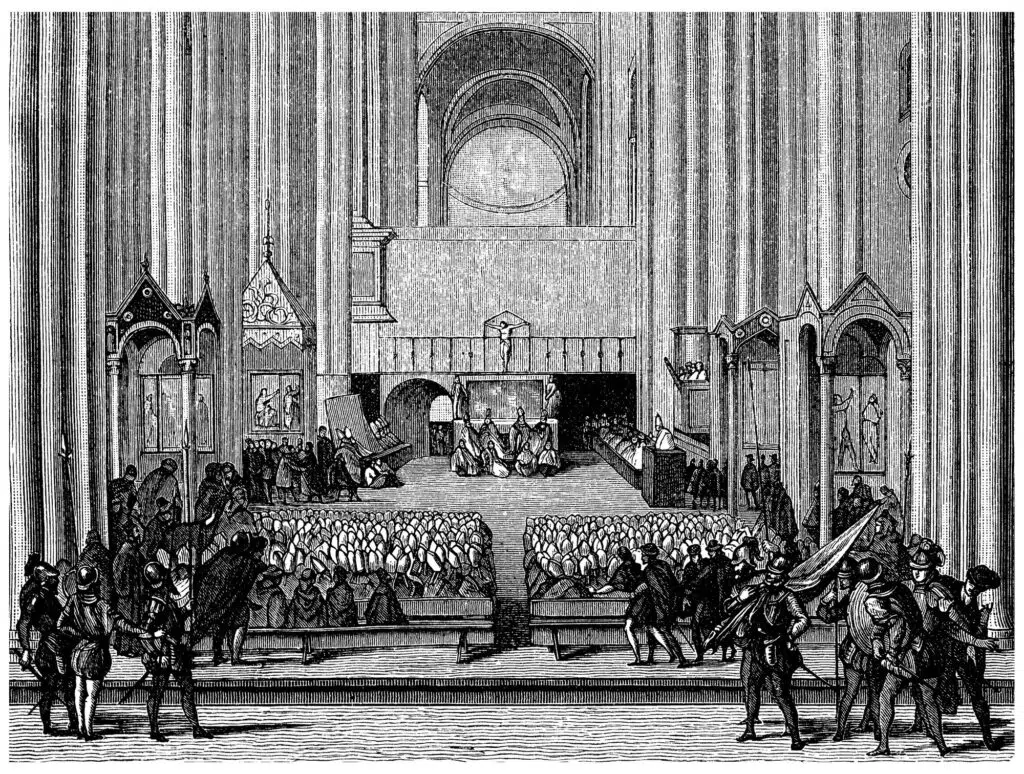Held between 1545 and 1563 in Trent, Northern Italy, the Council Of Trent was the nineteenth ecumenical council of the Catholic Church. Also known as a general council, this event was a meeting of bishops and other important figures in the church to discuss, debate, and ultimately rule on various questions surrounding the Catholic doctrine. The ecumenical council at Trent was brought about because of the Protestant Reformation. The Council Of Trent sought to issue condemnations on what it saw as a defiance of the beliefs of the Catholic Church by followers of the Protestant movement sweeping like wildfire across Europe (And America’s very soon).
The Council Of Trent, for many people, stands as the birth of the modern Roman Catholic Church. Through twenty-five meetings, dating from December 13th, 1545 to December 4th, 1563, key statements and clarifications were established around the teachings of the Church as well as its doctrines, scriptures, sacred traditions, the concept of original sin, the sacraments, Mass, veneration of saints and other issues such as justification and salvation. The outcomes of the Council Of Trent would be significant in the liturgy of the Catholic Church and its practices moving forward.
Why Did The Council Of Trent Occur?
The Catholic Church deemed the Council Of Trent necessary due to the advancement of the Protestant Reformation. Through these meetings, church leaders aimed to achieve two primary goals. The first objective was to refute Protestantism and to uphold the role of the church and the authority of the Pope. The second aim of the council was to accept critique from those of the Protestant faith and look into allegations of abuse and corruption by the Catholic Church so that their reputation could be restored. With this approach, it was thought that they could prevent more people from shifting to the Protestant faith.
On October 31st, 1517, the Protestant Reformation began in Wittenberg, Germany, when Martin Luther published a document titled “Disputation On The Power And Efficacy Of Indulgences” or “Ninety-Five Theses.” Luther was a teacher and monk, and in this document, he outlined ninety-five different ideas he had about Christianity, which he invited members of the public to debate with him.
Members of the Catholic Church believed that the process of salvation continued after death in a place that believers call Purgatory and that you could only pass through to heaven from purgatory once you were completely wholesome. To help anyone with loved ones who had passed and may be in purgatory or to make your own passage easier, indulgences could be purchased from the church. With these indulgences, the Catholic Church assured members that their time in purgatory would be shortened.
Martin Luther took great issue with the sale of indulgences. His 95 outlined his complaints about the Catholic church, including the sale of indulgences, as well as the importance of faith over works and the primacy of scripture over the traditions of the churches. Through his criticisms, he developed some core concepts, which would remain at the center of the Protestant faith moving forward.
Criticisms The Council Of Trent Had To Face
The Council Of Trent had to deal with the criticisms that Martin Luther outlined and accept or refute his views. Some of the more high-profile complaints that Luther brought to the attention of the Catholic Church included:
· Sola Fide–Faith Alone
This meant that nothing other than faith in God should be required for salvation.
· Sola Scriptura–Scripture Alone
Luther believed that church traditions and reasoning should be based only on the words found in the bible.
· Sola Gratia–Grace Alone
“Grace Alone” means that God offers salvation as a gift, and there is nothing you can do to influence this.
· Solus Christus–Christ Alone
Martin Luther felt that a believer’s relationship with God alone was most important and that they should pray to Jesus directly. The clergy does not hold influence over this relationship.
· Solo Deo Gloria–Only The Glory Of God
The Protestant Reformation was often viewed as anti-clerical. Protestants were of the belief that bishops and other high-ranking clergy took the glory that belonged to God and that the Church was too conspicuous and extravagant.
The Council of Trent Begins The Process Of the Counter-Reformation
With the Catholic Church facing real opposition, the Council of Trent set about countering the Protestant Reformation. They began the process of the Counter-Reformation in an effort to slow the growth of Protestantism by labeling Protestant beliefs as a denial of the faith as defined by the Church. Newly established religious orders and other groups rose up to enforce the Council Of Trent, with Roman Catholic leaders further emphasizing those beliefs and devotional subjects that Protestants were attacking. In the aftermath of the Protestant Reformation, groups such as the Jesuits, who swore special obedience to the Pope, were focused solely on educating people about the Catholic faith in an effort to reconstruct church life. In their role as leaders of the Counter-Reformation, they became known as the “shock troops of the Counter-Reformation”.
The Church Seeks To Reestablish Authority In Europe And Overseas
One of the primary goals of the Counter-Reformation was to travel overseas to parts of the world that had been colonized by countries that identified as Roman Catholic, such as Portugal and Spain. Traveling to these countries to spread their beliefs would help to reestablish power in areas outside of Europe, making up for territory that the church had lost in Europe. The Church carried out millions of baptisms in both Asia and the New World. They also pushed into Northern Europe, where Luther had been from, and by the end of the sixteenth century, had regained territories above Bavaria and Austria. The incredibly violent Wars Of Religion from 1562 to 1598 allowed the Roman Catholic Church to regain France, which had previously led many French Protestants like Jean Ribault to seek refuge in the New World.
